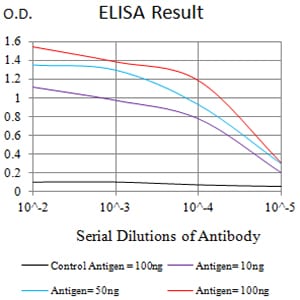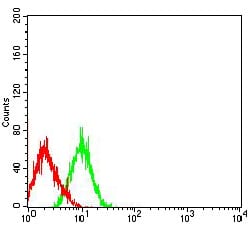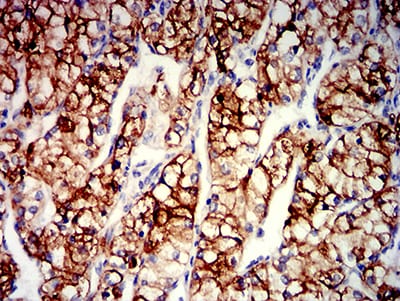


| WB | 咨询技术 | Human,Mouse,Rat |
| IF | 咨询技术 | Human,Mouse,Rat |
| IHC | 1/200 - 1/1000 | Human,Mouse,Rat |
| ICC | 技术咨询 | Human,Mouse,Rat |
| FCM | 1/200 - 1/400 | Human,Mouse,Rat |
| Elisa | 1/10000 | Human,Mouse,Rat |
| Aliases | ENPP3; B10; NPP3; PDNP3; PD-IBETA |
| Entrez GeneID | 5169 |
| clone | 4C1H2 |
| WB Predicted band size | 100.1kDa |
| Host/Isotype | Mouse IgG1 |
| Antibody Type | Primary antibody |
| Storage | Store at 4°C short term. Aliquot and store at -20°C long term. Avoid freeze/thaw cycles. |
| Species Reactivity | Human |
| Immunogen | Purified recombinant fragment of human CD203C (AA: extra 45-163) expressed in E. Coli. |
| Formulation | Purified antibody in PBS with 0.05% sodium azide |
+ +
以下是关于CD203c抗体的3篇参考文献及其摘要概括:
1. **"CD203c-based basophil activation test in allergy diagnosis: A review"**
- **作者**: Hennersdorf, F. 等
- **摘要**: 该文献综述了CD203c作为嗜碱性粒细胞激活标志物在过敏诊断中的应用,指出其通过流式细胞术检测过敏原特异性激活的敏感性和特异性,适用于食物过敏和呼吸道过敏的临床评估。
2. **"CD203c expression on basophils and mast cells in systemic mastocytosis"**
- **作者**: Valent, P. 等
- **摘要**: 研究分析了CD203c在系统性肥大细胞增多症(SM)患者肥大细胞和嗜碱性粒细胞中的表达,发现其高表达与疾病活动性相关,可作为诊断和监测SM的生物标志物。
3. **"Molecular characterization of CD203c: A novel activation marker on human basophils"**
- **作者**: Bühring, H.J. 等
- **摘要**: 首次描述了CD203c的分子特征及其作为嗜碱性粒细胞激活特异性标记物的功能,开发了针对该抗原的单克隆抗体,并验证其在过敏原刺激后的表达上调机制。
4. **"Utility of CD203c in chronic urticaria for assessing basophil activation"**
- **作者**: Yoshimura, C. 等
- **摘要**: 探讨CD203c在慢性荨麻疹患者嗜碱性粒细胞中的表达水平,发现其与疾病严重程度相关,可能作为评估治疗效果和病理机制的指标。
(注:以上文献信息为示例性概括,具体内容需根据实际研究调整。)
CD203c, also known as ectonucleotide pyrophosphatase/phosphodiesterase 3 (ENPP3), is a transmembrane glycoprotein belonging to the ectoenzyme family. It exhibits enzymatic activity, hydrolyzing extracellular nucleotides like ATP and NAD+, and is involved in purinergic signaling pathways. Primarily expressed on the surface of basophils and mast cells, CD203c serves as a dynamic activation marker for these cells, with its surface expression upregulated upon IgE-mediated stimulation or exposure to allergens.
The CD203c antibody specifically targets this glycoprotein, enabling its detection and quantification in clinical and research settings. Its application is particularly valuable in allergy diagnostics. Flow cytometry using CD203c antibodies allows precise identification of activated basophils in peripheral blood, offering a functional approach to assess individual sensitization patterns. This method (basophil activation test) demonstrates higher sensitivity and specificity compared to traditional IgE measurements or skin prick tests, especially for drug allergies and complex food allergies.
Moreover, CD203c antibodies help differentiate basophils from other granulocytes due to its lineage-specific expression. While CD63 is another basophil activation marker, CD203c shows earlier and more sustained upregulation post-activation, making it advantageous for clinical testing. Ongoing research explores its potential in monitoring immunotherapy efficacy and understanding mast cell-related disorders.
×